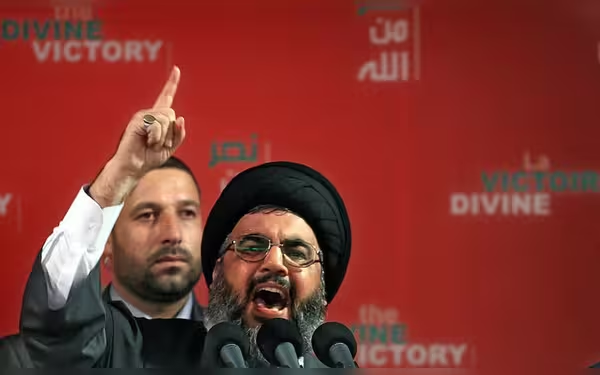Sunday, October 6, 2024 12:25 AM
Khamenei Warns Nasrallah of Israeli Assassination Plot
- Khamenei warns Nasrallah of Israeli assassination threat.
- Hezbollah leader killed in Israeli airstrike.
- Iran retaliates with missile strikes against Israel.
 Image Credits: arabnewspk
Image Credits: arabnewspkKhamenei warns Nasrallah of an Israeli plot, leading to his assassination and Iran's missile retaliation.
In a shocking turn of events, Iran’s Supreme Leader Ayatollah Ali Khamenei has reportedly warned Hezbollah leader Hassan Nasrallah about a potential Israeli plot to assassinate him. This warning came just days before Nasrallah was killed in an Israeli airstrike, raising serious concerns about Israeli infiltration within the ranks of both Hezbollah and the Iranian government.
According to multiple Iranian sources, Khamenei sent a message through a senior commander of the Iranian Revolutionary Guards, Brig. Gen. Abbas Nilforoushan, urging Nasrallah to flee Lebanon for safety. The intelligence reports indicated that Israel had operatives embedded within Hezbollah, posing a direct threat to Nasrallah’s life. Tragically, Nilforoushan was also killed in the same attack that targeted Nasrallah’s bunker.
In retaliation for these deaths, Khamenei ordered a significant missile strike against Israel, launching around 200 missiles. This military action was described as a response to the loss of key figures in Hezbollah, which has long been a crucial ally of Iran in the region.
The situation has created a ripple effect of fear and mistrust within Iran and Hezbollah. The assassination of Nasrallah, following a series of precise Israeli strikes that had already decimated Hezbollah’s leadership, has left Iran questioning the loyalty of its own ranks. Reports suggest that Iranian authorities are now investigating potential infiltrations within the Revolutionary Guards and other security agencies, particularly focusing on individuals who have traveled abroad or have family members living outside Iran.
Experts believe that the loss of Nasrallah and the subsequent chaos within Hezbollah could lead Iran to adopt a more aggressive stance, potentially targeting Israeli embassies and personnel abroad. This shift could mark a return to tactics that were more common before the rise of Iran’s proxy forces.
Furthermore, the assassination has strained the relationship between Tehran and Hezbollah, with trust eroding rapidly. A senior Iranian official noted, "The trust that held everything together has disappeared," highlighting the deep-seated fears that Khamenei now harbors regarding the safety of his leadership.
As the dust settles on this tragic event, the implications for the broader geopolitical landscape remain significant. The ongoing conflict between Iran and Israel, coupled with the internal strife within Hezbollah, could lead to unpredictable outcomes in the region. Observers are left to ponder how these developments will shape the future of Iran’s Axis of Resistance and its ongoing struggle against Israeli influence.
The assassination of Hassan Nasrallah not only represents a significant loss for Hezbollah but also raises critical questions about the security and stability of Iran’s leadership. As both nations navigate this turbulent period, the potential for further conflict looms large, reminding us of the fragile nature of alliances in the ever-evolving landscape of Middle Eastern politics.













